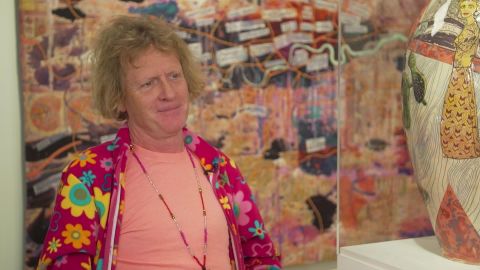Read Transcript EXPAND
CHRISTIANE AMANPOUR: Should there be a red line for something in the field as serious as genocide, not just something you disagree with what a writer might have said in his political life, but something on this level?
HERWIG: This is a crucial point because Handke can never condone or justified or simplified with the crime committed by Serbs. What he did, he pointed out that Serbs were also victims. Now, he is surely guilty of the sin of comparison and —
AMANPOUR: The sin of relativism because they weren’t also victims as much as the Bosnians and the others were.
HERWIG: Well, but that’s exactly the point. I mean, the international tribunal —
AMANPOUR: I mean, 8,000 —
HERWIG: — that not just convict Serbs —
AMANPOUR: Correct.
HERWIG: — but, of course, the Serbs were the main perpetrators.
AMANPOUR: Correct, correct.
HERWIG: Milosevic was responsible —
AMANPOUR: Absolutely. And —
HERWIG: — mainly for the —
AMANPOUR: — that’s the point. Isn’t that point? 8,000 Muslim boys and men were slaughtered in Srebrenica. This is what the spokesman for the mothers of Srebrenica said.
(BEGIN VIDEO CLIP)
MUNIRA SUBASIC, PRESIDENT, MOTHERS OF SREBRENICA ASSOCIATION (THROUGH TRANSLATOR): Awards used to be given to those who were standing for peace, for those that were of benefit to mankind in the world. This award, however, has shocked us and it is hurting us and it has brought us back to 1995. I don’t know what kind of message this sends to our grandchildren. I simply don’t have an answer to this.
(END VIDEO CLIP)
AMANPOUR: So, again, we’re talking about the most heinous crimes under international law. And the crimes that were meant to remember and not repeat because of what happened in our modern history and that’s Nazism and because of what then lead to Europe as a project for peace amongst others.
HERWIG: I have to clarify at this point because when we talk about [13:15:00] the Srebrenica massacre, Handke called massacre in Srebrenica the worst crime against humanity in Europe since 1945.
AMANPOUR: But he also said —
HERWIG: So, he’s absolutely —
AMANPOUR: — the Bosnians in Sarajevo staged their own massacre. In other words, killed themselves.
HERWIG: Sure. But this is about Srebrenica.
AMANPOUR: Correct.
HERWIG: I want to just clarify this —
AMANPOUR: All right.
HERWIG: — particular point because that’s how we need to start. We can, you know, criticize him for what he got wrong. He also got the killings in Visegrad wrong by the way, absolutely. So, take him to task for that but not as apologist of genocide and mass massacres like in Srebrenica.
FRANKOPAN: But he was at the funeral of Milosevic. He didn’t have to go to that. He chose and wanted to make a statement —
HERWIG: True.
FRANKOPAN: — of solidarity with the Serbs, with Milosevic. He could have done it in all sorts of different ways but it’s such an aggressive statement to say that he wants to be there when this man is buried, is put into the ground. And I don’t know what the tribunal would have ruled with Milosevic. They never got that far. But I think anybody who spent time in the Balkans in the ’90s had no illusions about what it was that —
HERWIG: Sure. He would have been found guilty.
FRANKOPAN: — Milosevic had done.
HERWIG: Yes.
FRANKOPAN: And so, to make that statement and to say, I’m only doing it to be an observer, seems to me quite a fancy way of dancing around reality.
About This Episode EXPAND
Peter Frankopan and Malte Herwig join Christiane Amanpour to discuss Peter Handke’s controversial Nobel Prize win. Artist Grayson Perry showcases his latest exhibition “Super Rich Interior Decoration.” Rhiannon Giddens pulls out her banjo for Walter Isaacson to illustrate the rich history of the instrument in American music. WARNING: This episode contains graphic images.
LEARN MORE


